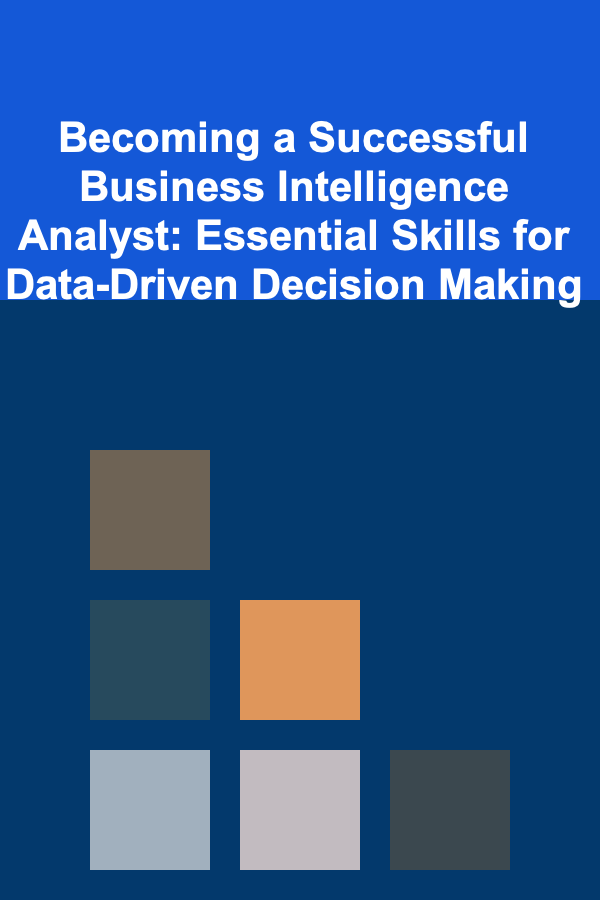
Becoming a Successful Business Intelligence Analyst: Essential Skills for Data-Driven Decision Making
ebook include PDF & Audio bundle (Micro Guide)
$12.99$7.99
Limited Time Offer! Order within the next:

In today's fast-paced, data-driven world, Business Intelligence (BI) has become a crucial element for organizations aiming to make informed decisions that enhance performance, drive growth, and improve strategic planning. A Business Intelligence Analyst is at the heart of this transformation, interpreting data, providing actionable insights, and enabling data-driven decision-making across an organization.
However, becoming a successful BI Analyst is not as simple as collecting data and generating reports. It involves a combination of technical skills, analytical thinking, problem-solving abilities, and strong communication. This guide will take you through the essential skills required to succeed as a BI Analyst, equipping you with the tools and methodologies needed to thrive in this data-driven environment.
Understanding the Role of a Business Intelligence Analyst
A Business Intelligence Analyst is responsible for turning raw data into valuable insights that help businesses make better decisions. The role goes beyond traditional data analysis---it's about understanding the organization's goals and translating data findings into actionable strategies.
Key Responsibilities:
- Data Collection and Integration: Gathering data from multiple sources, such as internal databases, third-party tools, and APIs.
- Data Cleaning and Preprocessing: Ensuring data quality by handling missing values, duplicates, and inconsistencies.
- Data Analysis: Using statistical methods and advanced techniques to uncover patterns, trends, and correlations.
- Reporting and Visualization: Creating compelling dashboards, charts, and reports that communicate insights effectively to stakeholders.
- Collaboration: Working with different departments (e.g., marketing, sales, finance) to ensure alignment between BI initiatives and business goals.
To excel in these areas, you must possess a deep understanding of both the technical and strategic aspects of business intelligence.
Essential Skills for a Successful BI Analyst
1. Technical Expertise in Data Analysis Tools
To be effective as a BI Analyst, you must have a strong command of the tools and technologies that enable data extraction, transformation, analysis, and reporting. Here are the key tools every BI Analyst should master:
- SQL (Structured Query Language): SQL is the backbone of data analysis. A BI Analyst should be proficient in querying databases, performing joins, aggregating data, and writing complex queries to extract insights from structured data.
- Data Visualization Tools (e.g., Tableau, Power BI, Qlik): Data visualization is a critical skill for communicating complex data insights clearly. BI Analysts should be able to create interactive dashboards, charts, and reports that highlight key trends and make data easy to interpret for non-technical audiences.
- Statistical Software (e.g., R, Python): Having basic knowledge of programming languages such as R or Python is invaluable. These tools allow you to perform advanced statistical analysis, run machine learning models, and manipulate large datasets.
- ETL Tools (e.g., Apache NiFi, Talend): Understanding how to manage the extraction, transformation, and loading (ETL) of data is essential, as it ensures that data flows seamlessly between systems and is properly formatted for analysis.
- Data Warehousing Solutions (e.g., Amazon Redshift, Google BigQuery): As BI Analysts work with large amounts of data, knowledge of data warehousing concepts and solutions is essential for managing and optimizing large datasets.
2. Strong Analytical Thinking
At its core, Business Intelligence is about turning raw data into meaningful insights. Strong analytical thinking is critical to ensure that you can identify patterns, trends, and correlations that others might miss. Key aspects of analytical thinking include:
- Problem Identification: Understanding the business problem and formulating the right questions before diving into data analysis.
- Hypothesis Testing: Formulating hypotheses based on initial observations and using statistical analysis to validate or refute those hypotheses.
- Data Interpretation: The ability to interpret complex data sets and make sense of seemingly unstructured data. This involves seeing beyond the numbers and understanding the broader context.
- Critical Thinking: As a BI Analyst, you must be able to challenge assumptions, consider alternative explanations, and explore various angles of analysis to find the most relevant insights.
3. Statistical Knowledge
Having a solid foundation in statistics is a key part of being a BI Analyst. Statistical methods are fundamental for drawing meaningful conclusions from data and identifying significant trends. Some of the essential statistical concepts include:
- Descriptive Statistics: Measures like mean, median, standard deviation, and percentiles help summarize the distribution of data.
- Inferential Statistics: Techniques like hypothesis testing, confidence intervals, and correlation analysis allow you to make predictions and inferences about a larger population from sample data.
- Regression Analysis: Understanding relationships between variables is crucial for forecasting trends and making predictions.
- ANOVA and Chi-Squared Tests: These tests are used to compare different groups or test the independence of variables.
A solid grasp of these statistical techniques enables you to assess the reliability of your results and draw insights that are statistically significant.
4. Data Visualization and Storytelling
The ultimate goal of data analysis is to communicate insights effectively. While raw data and complex statistical models are essential, they need to be presented in a way that is digestible for decision-makers. This is where data visualization and storytelling come in.
- Choosing the Right Visualization: Understanding the different types of visualizations (e.g., bar charts, line graphs, heatmaps, pie charts) and knowing when to use each one is essential for conveying the message clearly.
- Interactive Dashboards: Tools like Tableau and Power BI allow you to create dashboards that let users explore data interactively, providing a deeper understanding of the information.
- Storytelling with Data: The best BI Analysts are also excellent storytellers. They take data and craft a narrative that illustrates key trends, insights, and recommendations. Effective storytelling helps to drive action by making the data more relatable and engaging.
5. Business Acumen
Data analysis is not performed in a vacuum---it needs to align with business goals and objectives. BI Analysts should develop a strong understanding of the business they're working for, including its processes, challenges, and strategies.
- Understanding Business Metrics: Knowing which KPIs (Key Performance Indicators) are most important for the business allows you to focus your analysis on what matters most.
- Industry Knowledge: Being familiar with the industry in which your business operates helps contextualize data, allowing you to understand trends, challenges, and opportunities.
- Stakeholder Management: BI Analysts often work closely with various stakeholders, such as department heads, project managers, and executives. Being able to translate technical insights into actionable business strategies is a critical skill.
6. Communication and Presentation Skills
It's not enough to just analyze data---you need to present it effectively to others. Strong communication and presentation skills are crucial for any BI Analyst.
- Clarity and Precision: Being able to explain complex data and insights in simple terms ensures that stakeholders with varying levels of technical expertise can understand the analysis.
- Tailored Presentations: Different audiences require different levels of detail. A presentation for an executive will be different from one for a technical team. BI Analysts should tailor their presentations to the audience's needs and knowledge level.
- Persuasion: Data-driven insights are only valuable if decision-makers act on them. BI Analysts should be able to present data in a way that convinces stakeholders to make data-driven decisions.
7. Collaboration and Teamwork
A successful BI Analyst doesn't work in isolation. BI Analysts need to collaborate with other departments, such as IT, marketing, finance, and operations, to ensure that the data analysis aligns with the overall goals of the organization. This collaboration can include:
- Understanding Business Needs: BI Analysts must work closely with stakeholders to understand their requirements and tailor their analysis accordingly.
- Feedback Loop: Once data is presented, BI Analysts should actively seek feedback and iterate on their analysis to ensure that it is aligned with business needs.
- Cross-functional Collaboration: In many cases, a BI Analyst will need to work with IT teams for data access and technical support, as well as with marketing and sales teams to interpret results in the context of business performance.
8. Continuous Learning and Adaptation
The world of Business Intelligence is always evolving, with new tools, techniques, and methodologies constantly emerging. To remain successful, BI Analysts must commit to continuous learning and self-improvement. This includes:
- Staying Current with Tools and Technology: New BI tools and features are introduced regularly, and BI Analysts need to stay updated with the latest advancements to remain competitive.
- Learning from Data: Analyzing past reports, understanding what worked and what didn't, and applying those lessons to future analyses is key to improving as a BI Analyst.
- Networking and Sharing Knowledge: Engaging with the BI community through conferences, webinars, and online forums is a great way to stay informed and learn from others in the field.
Conclusion
Becoming a successful Business Intelligence Analyst is a combination of technical expertise, analytical thinking, effective communication, and a deep understanding of business processes. By mastering the essential skills outlined in this guide, you can transform raw data into valuable insights that drive data-driven decision-making and help organizations achieve their strategic objectives. As businesses increasingly rely on data to make informed decisions, the role of the BI Analyst is more important than ever. With the right skills and mindset, you can unlock the full potential of data and make a significant impact on your organization's success.

How to Create a Checklist for Providing Employee References After Offboarding
Read More
How to Develop a Crisis Management Checklist for Crisis Response Teams
Read More
How to Make Your Rental Property Stand Out to Potential Tenants
Read More
How to Reduce Debt While Managing Your Household Budget
Read More
How to Use Pet-themed Decor to Enhance Organization
Read More
Smart Strategies for Saving Money on Home Remodeling Projects and Staying on Track
Read MoreOther Products

How to Create a Checklist for Providing Employee References After Offboarding
Read More
How to Develop a Crisis Management Checklist for Crisis Response Teams
Read More
How to Make Your Rental Property Stand Out to Potential Tenants
Read More
How to Reduce Debt While Managing Your Household Budget
Read More
How to Use Pet-themed Decor to Enhance Organization
Read More